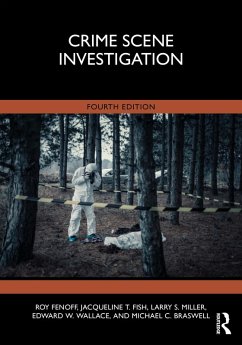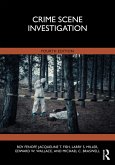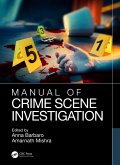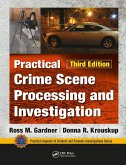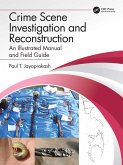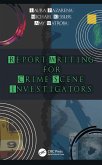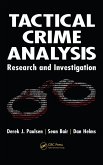Roy Fenoff, Jacqueline T. Fish, Larry S. Miller, Edward W. Wallace, Michael C. Braswell
Crime Scene Investigation (eBook, PDF)
76,95 €
76,95 €
inkl. MwSt.
Sofort per Download lieferbar

38 °P sammeln
76,95 €
Als Download kaufen

76,95 €
inkl. MwSt.
Sofort per Download lieferbar

38 °P sammeln
Jetzt verschenken
Alle Infos zum eBook verschenken
76,95 €
inkl. MwSt.
Sofort per Download lieferbar
Alle Infos zum eBook verschenken

38 °P sammeln
Roy Fenoff, Jacqueline T. Fish, Larry S. Miller, Edward W. Wallace, Michael C. Braswell
Crime Scene Investigation (eBook, PDF)
- Format: PDF
- Merkliste
- Auf die Merkliste
- Bewerten Bewerten
- Teilen
- Produkt teilen
- Produkterinnerung
- Produkterinnerung

Bitte loggen Sie sich zunächst in Ihr Kundenkonto ein oder registrieren Sie sich bei
bücher.de, um das eBook-Abo tolino select nutzen zu können.
Hier können Sie sich einloggen
Hier können Sie sich einloggen
Sie sind bereits eingeloggt. Klicken Sie auf 2. tolino select Abo, um fortzufahren.

Bitte loggen Sie sich zunächst in Ihr Kundenkonto ein oder registrieren Sie sich bei bücher.de, um das eBook-Abo tolino select nutzen zu können.
Crime Scene Investigation offers an innovative approach to learning about crime scene investigation, taking the reader from the first response on the crime scene to documenting crime scene evidence and preparing evidence for courtroom presentation.
- Geräte: PC
- ohne Kopierschutz
- eBook Hilfe
- Größe: 57.29MB
Andere Kunden interessierten sich auch für
![Crime Scene Investigation (eBook, ePUB) Crime Scene Investigation (eBook, ePUB)]() Roy FenoffCrime Scene Investigation (eBook, ePUB)76,95 €
Roy FenoffCrime Scene Investigation (eBook, ePUB)76,95 €![Manual of Crime Scene Investigation (eBook, PDF) Manual of Crime Scene Investigation (eBook, PDF)]() Manual of Crime Scene Investigation (eBook, PDF)74,95 €
Manual of Crime Scene Investigation (eBook, PDF)74,95 €![Practical Crime Scene Processing and Investigation, Third Edition (eBook, PDF) Practical Crime Scene Processing and Investigation, Third Edition (eBook, PDF)]() Ross M. GardnerPractical Crime Scene Processing and Investigation, Third Edition (eBook, PDF)71,95 €
Ross M. GardnerPractical Crime Scene Processing and Investigation, Third Edition (eBook, PDF)71,95 €![Crime Scene Staging Dynamics in Homicide Cases (eBook, PDF) Crime Scene Staging Dynamics in Homicide Cases (eBook, PDF)]() Laura Gail PettlerCrime Scene Staging Dynamics in Homicide Cases (eBook, PDF)34,95 €
Laura Gail PettlerCrime Scene Staging Dynamics in Homicide Cases (eBook, PDF)34,95 €![Crime Scene Investigation and Reconstruction (eBook, PDF) Crime Scene Investigation and Reconstruction (eBook, PDF)]() Paul T. JayaprakashCrime Scene Investigation and Reconstruction (eBook, PDF)69,95 €
Paul T. JayaprakashCrime Scene Investigation and Reconstruction (eBook, PDF)69,95 €![Report Writing for Crime Scene Investigators (eBook, PDF) Report Writing for Crime Scene Investigators (eBook, PDF)]() Laura PazarenaReport Writing for Crime Scene Investigators (eBook, PDF)51,95 €
Laura PazarenaReport Writing for Crime Scene Investigators (eBook, PDF)51,95 €![Tactical Crime Analysis (eBook, PDF) Tactical Crime Analysis (eBook, PDF)]() Derek J. PaulsenTactical Crime Analysis (eBook, PDF)37,95 €
Derek J. PaulsenTactical Crime Analysis (eBook, PDF)37,95 €-
-
-
Crime Scene Investigation offers an innovative approach to learning about crime scene investigation, taking the reader from the first response on the crime scene to documenting crime scene evidence and preparing evidence for courtroom presentation.
Dieser Download kann aus rechtlichen Gründen nur mit Rechnungsadresse in A, B, BG, CY, CZ, D, DK, EW, E, FIN, F, GR, HR, H, IRL, I, LT, L, LR, M, NL, PL, P, R, S, SLO, SK ausgeliefert werden.
Produktdetails
- Produktdetails
- Verlag: Taylor & Francis
- Seitenzahl: 468
- Erscheinungstermin: 26. Dezember 2022
- Englisch
- ISBN-13: 9780429523779
- Artikelnr.: 66346454
- Verlag: Taylor & Francis
- Seitenzahl: 468
- Erscheinungstermin: 26. Dezember 2022
- Englisch
- ISBN-13: 9780429523779
- Artikelnr.: 66346454
- Herstellerkennzeichnung Die Herstellerinformationen sind derzeit nicht verfügbar.
Roy Fenoff is an Associate Professor in the Department of Criminal Justice at The Military College of South Carolina (The Citadel). He is also a Forensic Document Examiner and an expert in forgery detection. Dr. Fenoff provides scientific advice, offers training, and conducts forensic examinations for individuals, law enforcement, and law firms throughout the United States and abroad. He earned a B.S. in Entomology and a B.A. in Criminal Justice from the University of Georgia in 2004, an M.S. in Medical/Veterinary Entomology from the University of Wyoming in 2007, and a Ph.D. in Criminal Justice from Michigan State University in 2015. Dr. Fenoff specializes in forgery and document fraud, food protection (food fraud and food defense), and transnational crime. Dr. Fenoff is a published author who has presented his work at a variety of criminal justice, food safety, and forensic science conferences. In addition to his current position at The Citadel, Dr. Fenoff is a voting member of the Forensic Document Examination Consensus Body of the American Academy of Forensic Sciences Standards Board, a member of the Document Security Alliance, the South Carolina Food Safety Task Force, and a research collaborator with the Food Fraud Prevention Academy (formally Michigan State University's Food Fraud Initiative).
Jacqueline T. Fish is the Vice President for Academic Affairs at Charleston Southern University. A former crime scene investigator and Lieutenant in the Knox County, Tennessee, Sherriff's Department, Dr. Fish was also project manager of the National Forensic Academy and worked with the Louisiana State University's National Center for Biomedical Research and Training to develop Advanced Forensics Investigations for Hazardous Environments.
Larry S. Miller is Distinguished Professor and Chair of Criminal Justice and Criminology at East Tennessee State University (ETSU). He received his Bachelor of Science from ETSU, Master of Science from Eastern Kentucky University, and Ph.D. in Health & Safety with collaterals in Forensic Anthropology and Criminology from The University of Tennessee. Miller, who has worked as a police officer, criminal investigator, and crime laboratory director, teaches in the area of law enforcement and is the author of several books on topics including criminal investigation, criminal justice report writing, police photography, and more.
Edward W. Wallace is the Director of Forensic Training at the New York City Office of Chief Medical Examiner. Wallace is also a Senior Adjunct Instructor and WMD Training Course Developer for Louisiana State University.
Michael C. Braswell is Professor Emeritus of Criminal Justice and Criminology at East Tennessee State University (ETSU). Braswell received his Bachelor of Arts in Psychology from Mercer University in 1969, Master of Arts in Psychology from West Georgia College in 1970, Ed.S. in Rehabilitation/Correctional Counseling from the University of Georgia in 1973, and Doctorate in Counseling Psychology from the University of Southern Mississippi. A former prison psychologist, he taught ethics and human relations courses for more than 30 years at East Tennessee State University. He has published books on ethics, peacemaking, and correctional counseling as well as two novels and a short story collection.
Jacqueline T. Fish is the Vice President for Academic Affairs at Charleston Southern University. A former crime scene investigator and Lieutenant in the Knox County, Tennessee, Sherriff's Department, Dr. Fish was also project manager of the National Forensic Academy and worked with the Louisiana State University's National Center for Biomedical Research and Training to develop Advanced Forensics Investigations for Hazardous Environments.
Larry S. Miller is Distinguished Professor and Chair of Criminal Justice and Criminology at East Tennessee State University (ETSU). He received his Bachelor of Science from ETSU, Master of Science from Eastern Kentucky University, and Ph.D. in Health & Safety with collaterals in Forensic Anthropology and Criminology from The University of Tennessee. Miller, who has worked as a police officer, criminal investigator, and crime laboratory director, teaches in the area of law enforcement and is the author of several books on topics including criminal investigation, criminal justice report writing, police photography, and more.
Edward W. Wallace is the Director of Forensic Training at the New York City Office of Chief Medical Examiner. Wallace is also a Senior Adjunct Instructor and WMD Training Course Developer for Louisiana State University.
Michael C. Braswell is Professor Emeritus of Criminal Justice and Criminology at East Tennessee State University (ETSU). Braswell received his Bachelor of Arts in Psychology from Mercer University in 1969, Master of Arts in Psychology from West Georgia College in 1970, Ed.S. in Rehabilitation/Correctional Counseling from the University of Georgia in 1973, and Doctorate in Counseling Psychology from the University of Southern Mississippi. A former prison psychologist, he taught ethics and human relations courses for more than 30 years at East Tennessee State University. He has published books on ethics, peacemaking, and correctional counseling as well as two novels and a short story collection.
Chapter 1. Introduction: The CSI and Forensic Investigation Chapter 2. The
First Response and Scene Search Chapter 3. Documenting the Crime Scene:
Photography, Videography, and Sketching Chapter 4. Fingerprints and
Palmprints Chapter 5. Trace and Impression Evidence Chapter 6. Bodily Fluid
Evidence Chapter 7. Blood Spatter Evidence Chapter 8. Firearms and Toolmark
Evidence Chapter 9. Arson and Explosives Chapter 10. The Electronic Crime
Scene Chapter 11. Documentary Evidence Chapter 12. Motor Vehicles as Crime
Scenes Chapter 13. Death Investigation Chapter 14. Forensic Anthropology,
Odontology, and Entomology Chapter 15. Documenting the Actions of the CSI
and Presenting Facts in Court, Crime Scene Supply Checklist, Glossary
First Response and Scene Search Chapter 3. Documenting the Crime Scene:
Photography, Videography, and Sketching Chapter 4. Fingerprints and
Palmprints Chapter 5. Trace and Impression Evidence Chapter 6. Bodily Fluid
Evidence Chapter 7. Blood Spatter Evidence Chapter 8. Firearms and Toolmark
Evidence Chapter 9. Arson and Explosives Chapter 10. The Electronic Crime
Scene Chapter 11. Documentary Evidence Chapter 12. Motor Vehicles as Crime
Scenes Chapter 13. Death Investigation Chapter 14. Forensic Anthropology,
Odontology, and Entomology Chapter 15. Documenting the Actions of the CSI
and Presenting Facts in Court, Crime Scene Supply Checklist, Glossary
Chapter 1. Introduction: The CSI and Forensic Investigation Chapter 2. The
First Response and Scene Search Chapter 3. Documenting the Crime Scene:
Photography, Videography, and Sketching Chapter 4. Fingerprints and
Palmprints Chapter 5. Trace and Impression Evidence Chapter 6. Bodily Fluid
Evidence Chapter 7. Blood Spatter Evidence Chapter 8. Firearms and Toolmark
Evidence Chapter 9. Arson and Explosives Chapter 10. The Electronic Crime
Scene Chapter 11. Documentary Evidence Chapter 12. Motor Vehicles as Crime
Scenes Chapter 13. Death Investigation Chapter 14. Forensic Anthropology,
Odontology, and Entomology Chapter 15. Documenting the Actions of the CSI
and Presenting Facts in Court, Crime Scene Supply Checklist, Glossary
First Response and Scene Search Chapter 3. Documenting the Crime Scene:
Photography, Videography, and Sketching Chapter 4. Fingerprints and
Palmprints Chapter 5. Trace and Impression Evidence Chapter 6. Bodily Fluid
Evidence Chapter 7. Blood Spatter Evidence Chapter 8. Firearms and Toolmark
Evidence Chapter 9. Arson and Explosives Chapter 10. The Electronic Crime
Scene Chapter 11. Documentary Evidence Chapter 12. Motor Vehicles as Crime
Scenes Chapter 13. Death Investigation Chapter 14. Forensic Anthropology,
Odontology, and Entomology Chapter 15. Documenting the Actions of the CSI
and Presenting Facts in Court, Crime Scene Supply Checklist, Glossary
